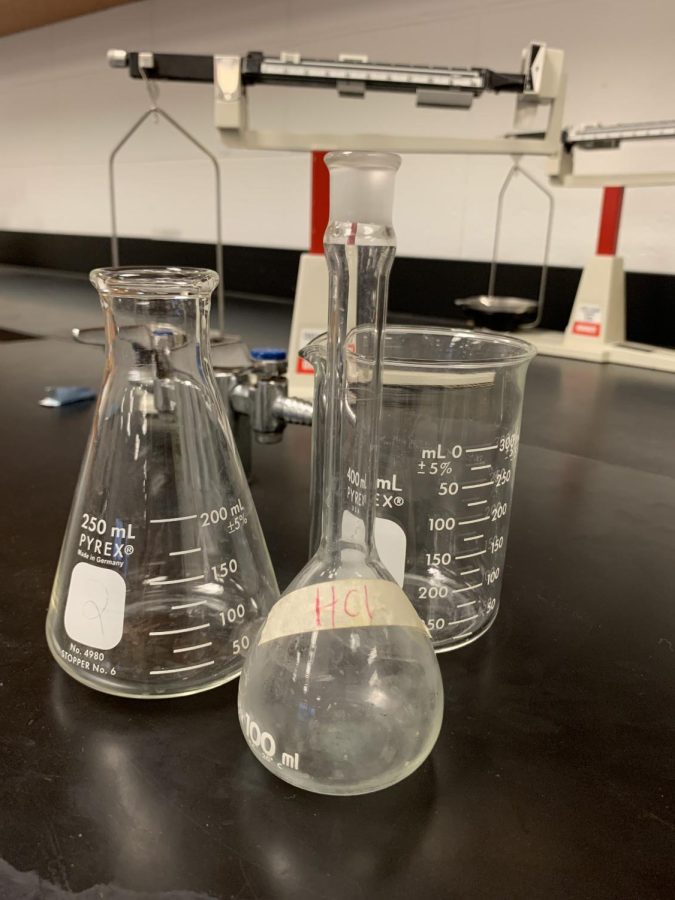The Power of Chemistry: One Student Shares His Passion for the Subject Matter
Chemistry apparatus, filled with the promise of ionic and covalent bonds, twinkles under the classroom lights.
When young children are asked what they want to be when they grow up, many of them spurt out “police officer” or “astronaut” or “princess.” When I was a young child, I said I wanted to be a chemist. Many people laughed at my response, and I must admit that I was not entirely sure what chemistry entailed at the time, but as I approach my adult life, chemistry is still the path I wish to follow.
I distinctly remember learning basic chemistry as a freshman in Living Environment and receiving a C on my test. That grade completely tarnished my idea of the subject, and I recall dreading the requirement to take chemistry as a sophomore. It was not until after I had completed my sophomore year when I returned to my objective of professionally pursuing chemistry. After taking a year of Chemistry Honors and receiving decent grades, I decided to take on the intimidating brute that is AP Chemistry, and only then did I notice my potential in the field.
No discipline defines our reality so particularly and so peculiarly as chemistry. From the outrageous principles of quantum theory to the familiar reactions and macro molecules of organic chemistry, our world is dictated by the laws of chemistry. It is remarkable how mind-boggling theoretical concepts such as superposition, vital biochemical processes like cellular respiration, and fundamental reactions like the combustion of ethanol in an engine live so beautifully together in a single field of study.
Most people who prefer classes in mathematics or sciences tend to claim that they like the lack of ambiguity in the subjects. I find this to be especially true with chemistry, and it is another reason why I enjoy it so much. In the humanities, interpretation is the foundation of any idea or experiment. In chemistry, most problems have a sole solution. Despite this, I find that chemistry involves a great deal of uncertainty. For example, quantum theory has revolutionized chemistry, but it is only a century old, and it has brought about a multitude of questions. Each year more and more fundamental information is uncovered about chemical science. Chemistry is harmoniously upraised by its lack of ambiguity and its simultaneous wealth of uncertainties.
Many people dislike chemistry as a subject because it is “difficult to visualize.” I cannot argue against this; it is not possible to accurately visualize particles or changes that are not visible to our eyes. Despite this difficulty, the subject is nonetheless incredibly interesting and in many ways intuitive. It is no coincidence that the way matter interacts on a large, tangible scale is akin to that on a molecular level.
In fact, even ways we think and interact as humans are comparable to chemical properties of matter. An example of this that I frequently ponder lies in our tendency to ruin order. Many people may strive for perfection and uniformity, but humanity is anything but uniform or perfect. We may try to create balance, but more often than not we upset the scales of the universe. I always look at this being appropriately described by the Second Law of Thermodynamics, which states that spontaneous chemical changes must increase the net entropy of a system. In colloquial terms, the universe favors reactions that increase entropy, or chaos. This is just one example of how chemistry is closely tied to our perceivable reality.
Connecting principles of chemistry to characteristics of humanity and of our large-scale reality is fascinating. Another example of this is the Uncertainty Principle, which states that since the uncertainty of the position of a particle and the uncertainty of the momentum of a particle vary directly and must be greater than a given value, it is not at all plausible to know both the exact location and speed of a particle. In other words, the location and speed of a particle can only be approximated on the basis of probability. While this may not seem to apply to everyday life, it can be used to describe how nearly all things we do and decisions we make are not based on ascertained knowledge but on likelihoods and judgments.
Although chemistry may bore many high school students and confuse many adults, it is difficult to ignore its peculiarity and its importance in our world. The concepts on which it is based are more familiar and intuitive than most people believe, and because of this, it is such a vital discipline. Without chemistry, we would not only lack many practical capabilities in fields such as research, medicine, and defense, but also lack basic understanding of the fundamental principles of our reality. Even if my adolescent mind was unaware of what chemistry entails, I still would not choose to follow any other path.
